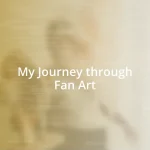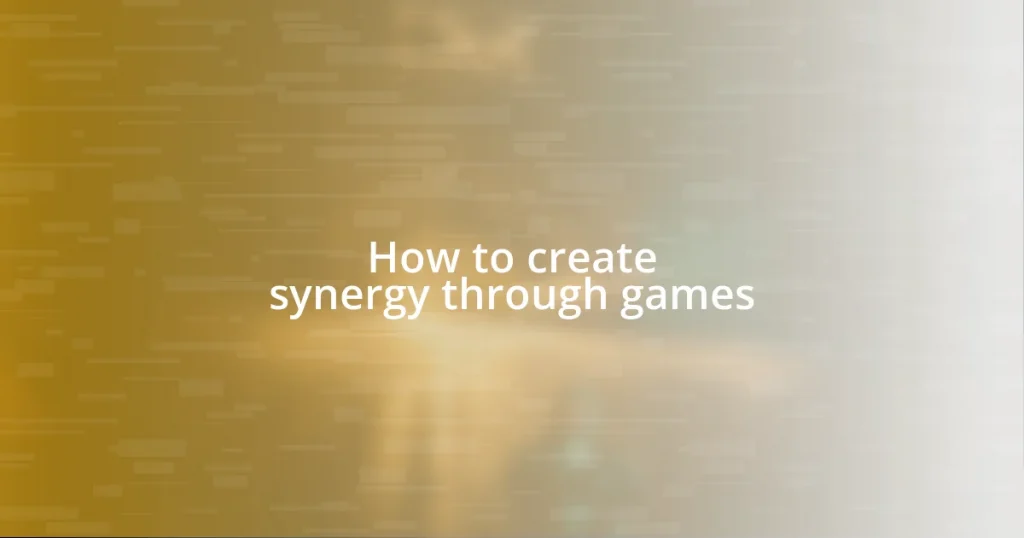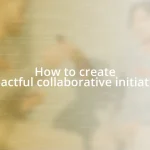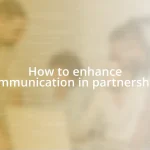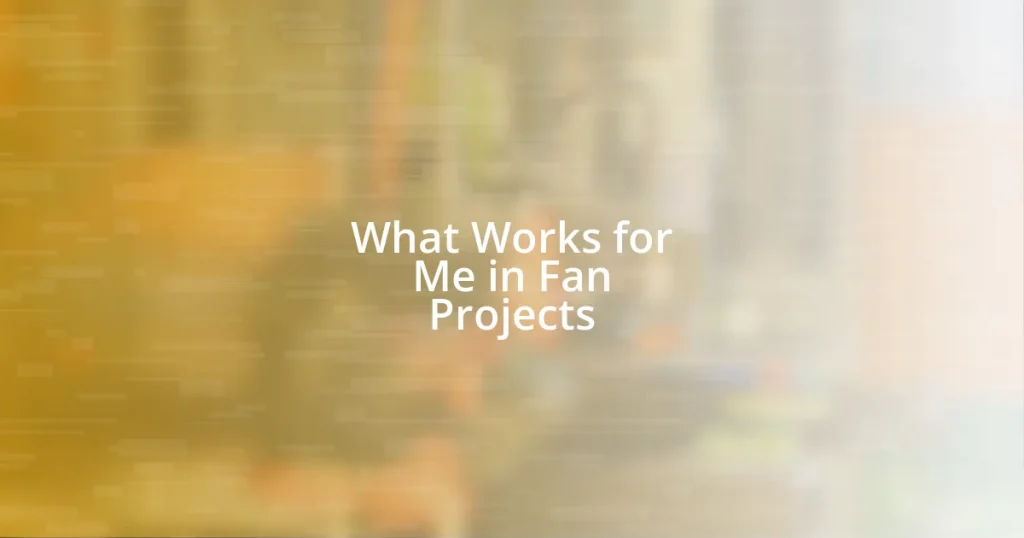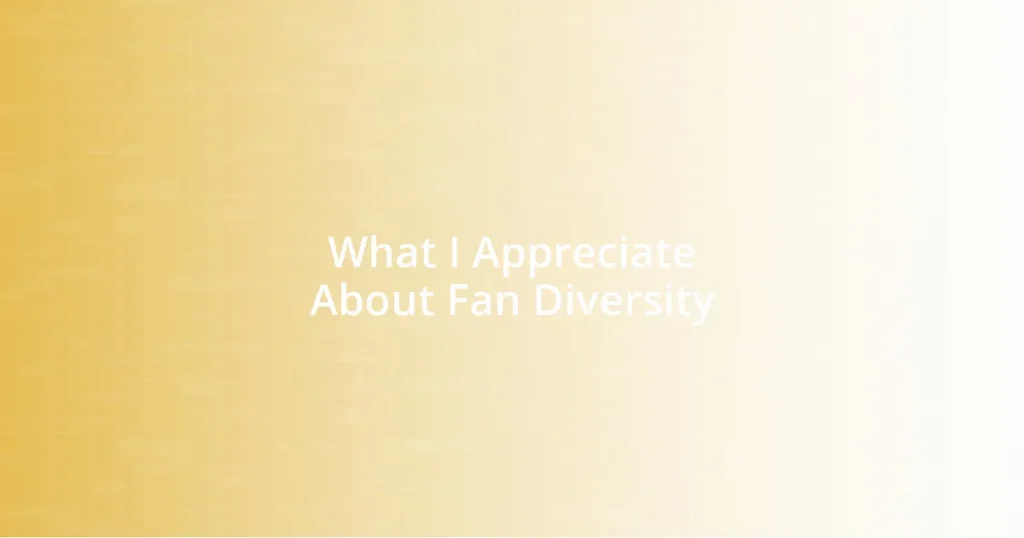Key takeaways:
- Synergy in teamwork is achieved through trust and effective communication, enhancing creativity and shared success.
- Games facilitate synergy by promoting open dialogue, building trust, and creating a strong team identity through shared experiences.
- Choosing the right games based on team goals and dynamics, along with effective facilitation and post-game reflection, enhances collaboration and learning outcomes.
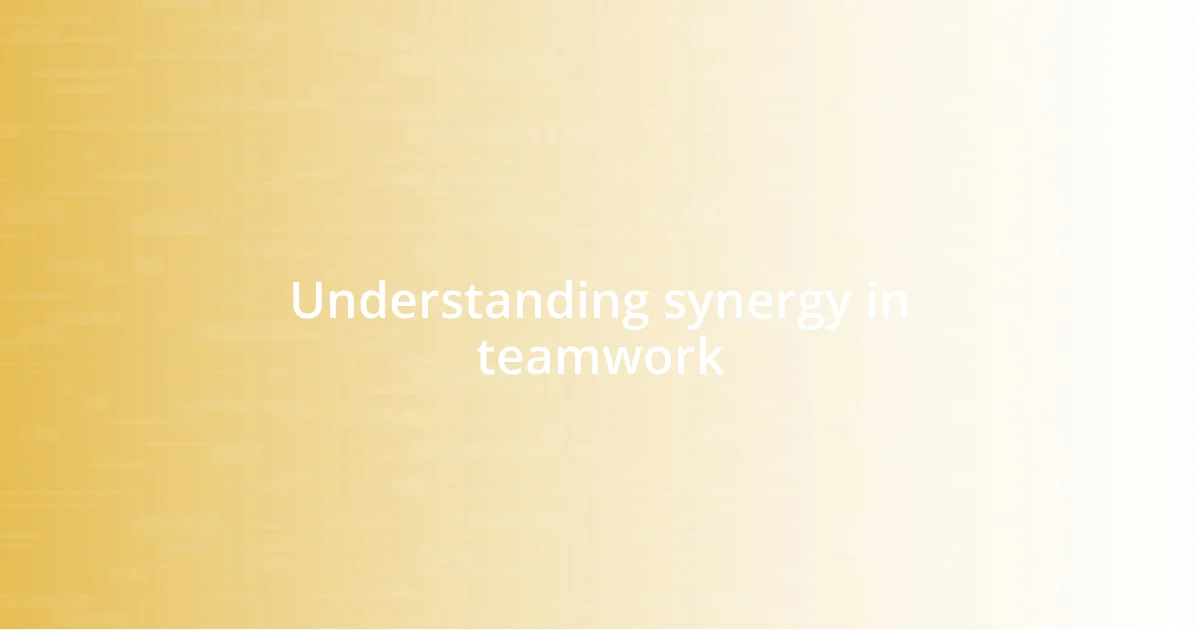
Understanding synergy in teamwork
Synergy in teamwork is like that magical moment when all the pieces fall into place, creating something greater than the sum of its parts. I remember a project where our diverse talents combined effortlessly; it was as if we were a well-rehearsed orchestra, each member contributing their unique sound to produce a beautiful symphony. Have you ever experienced that feeling when collaboration just clicks?
When team members genuinely trust and communicate with one another, they open the door to innovative solutions and shared success. One time, during a brainstorming session, a colleague’s wild idea sparked a chain reaction that led us to an unexpected yet brilliant outcome. This experience taught me that embracing vulnerability within a team can lead to increased creativity—so why not take that leap?
It’s vital to recognize that synergy doesn’t happen overnight. It requires nurturing relationships and fostering an environment where everyone feels valued and heard. I believe that celebrating small victories together helps solidify that bond, making each team member feel integral to the greater mission. How do you cultivate a sense of unity in your teams?
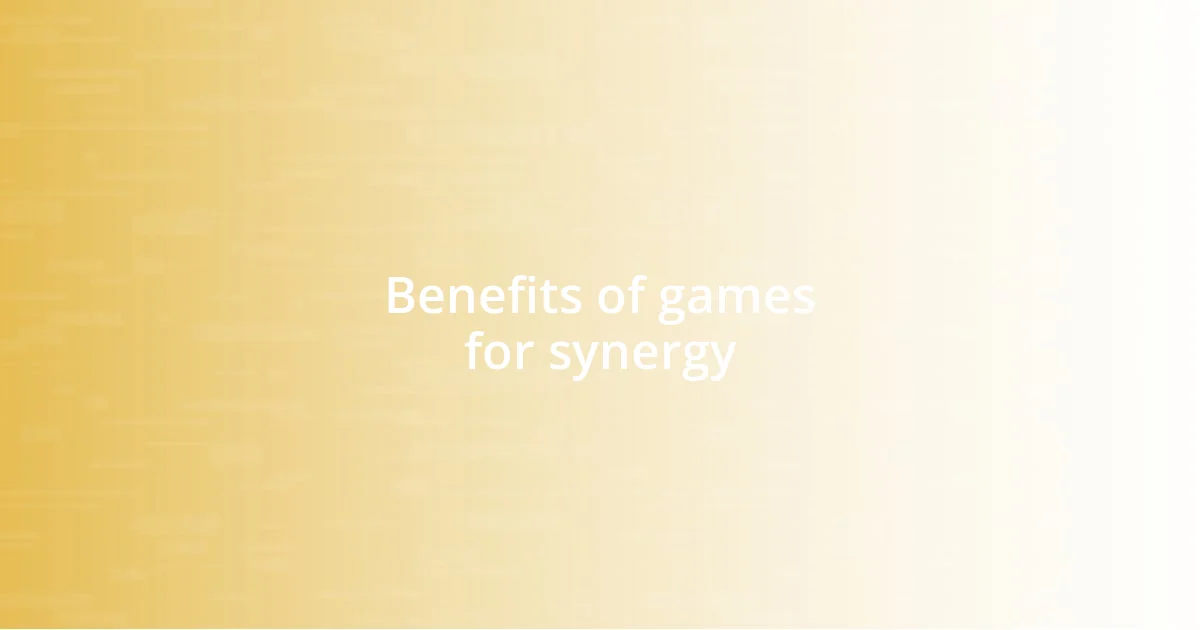
Benefits of games for synergy
When it comes to fostering synergy through games, the benefits are genuinely profound. I’ve witnessed firsthand how engaging in playful competition can break down hierarchical barriers within a team, creating an environment where everyone feels equal and valued. Once, during a team-building retreat, our group tackled a challenging escape room. We learned to lean on each other’s strengths, transforming a stressful situation into an unforgettable experience that solidified our trust.
Here’s a quick list of benefits games bring to fostering synergy:
- Enhanced Communication: Games often require teams to strategize together, leading to more open and effective dialogue.
- Increased Trust: Experiencing victories and defeats together fosters deep connections and mutual respect.
- Creative Problem-Solving: Games encourage out-of-the-box thinking, helping teams innovate and collaborate more effectively.
- Reduced Stress: Playfulness helps ease tension, allowing for a more relaxed environment where ideas can flow freely.
- Strengthened Team Identity: Shared experiences in games create lasting memories and a sense of belonging that enhances teamwork.
In my experience, it’s these moments of lighthearted engagement that often yield the most significant insights and improvements in collaboration.
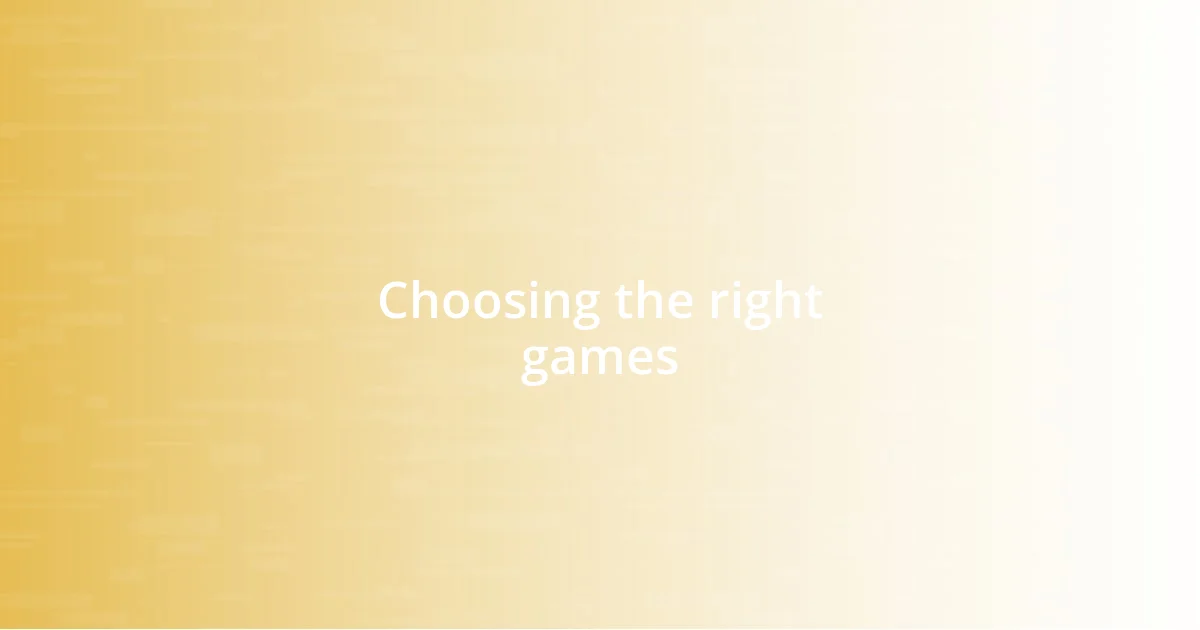
Choosing the right games
Choosing the right games can be pivotal in achieving that synergy we all desire. I remember a time when my team selected a board game that unexpectedly brought out everyone’s competitive spirit. It was fascinating to see how a simple game could reveal leadership qualities and hidden talents. Have you ever wondered how the right game can accelerate teamwork?
When selecting games, consider the diverse personalities and skill sets in your group. For example, a fast-paced trivia game may energize some, while others might thrive in more strategic challenges like cooperative board games. Reflecting on what excites your team is essential in making the right choice.
One crucial aspect to keep in mind is the goals you want to achieve. Games focused on communication might be fantastic for teams that struggle with expressing ideas, while problem-solving games can help enhance collaboration. From my experience, identifying these goals ensures that the game selected resonates with the team’s specific needs.
| Game Type | Ideal For |
|---|---|
| Trivia Games | Quick thinking, general knowledge, team bonding |
| Cooperative Board Games | Strategic thinking, teamwork, leadership skills |
| Outdoor Team Challenges | Physical engagement, building trust, creativity |
| Role-Playing Games | Storytelling, empathy, understanding different perspectives |
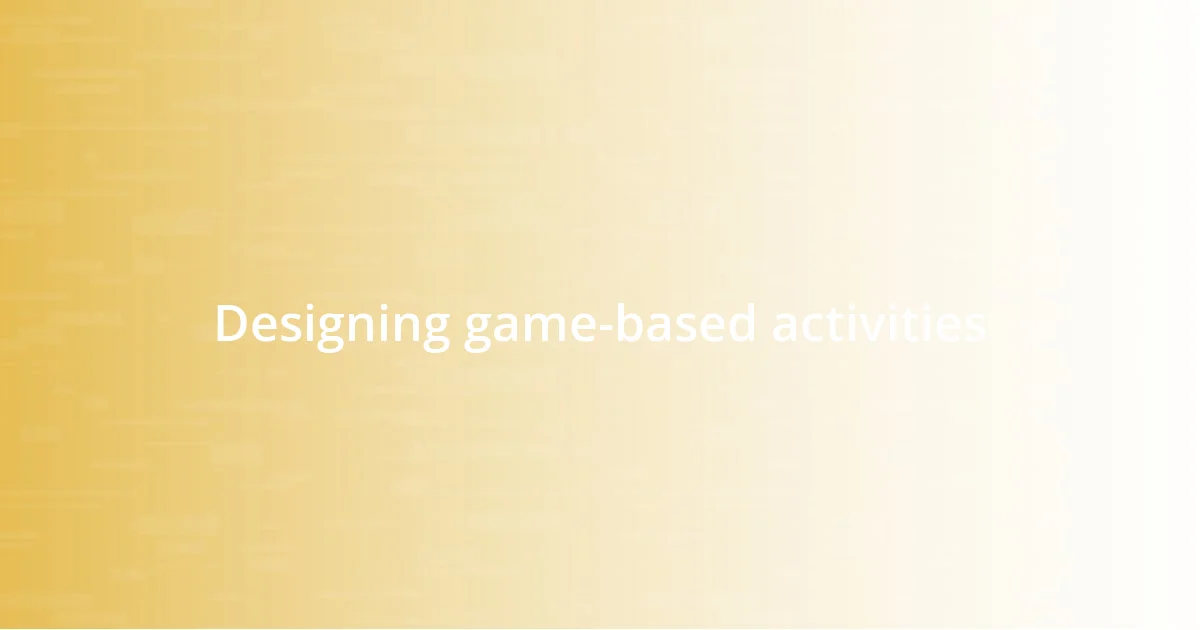
Designing game-based activities
When designing game-based activities, I find it crucial to align the games with the desired outcomes. For instance, I once organized a scavenger hunt that not only promoted teamwork but also encouraged innovative thinking. Have you ever seen a group come together under time pressure? It’s exhilarating to witness as they brainstorm strategies and share ideas.
Creating a balanced mix of challenge and fun is another key factor. During a recent team workshop, we tried a game that seemed simple but had layers of complexity, pushing everyone out of their comfort zones. I could feel the excitement in the air as we navigated through challenges, each small victory sparking a sense of camaraderie that was palpable.
Lastly, don’t underestimate the power of debriefing after gameplay. Taking time to reflect on experiences can deepen insights and solidify lessons learned. In my experience, a simple conversation about what went well and what didn’t led to richer connections and better collaboration in future projects. It’s fascinating how these moments can transform into valuable learning opportunities!
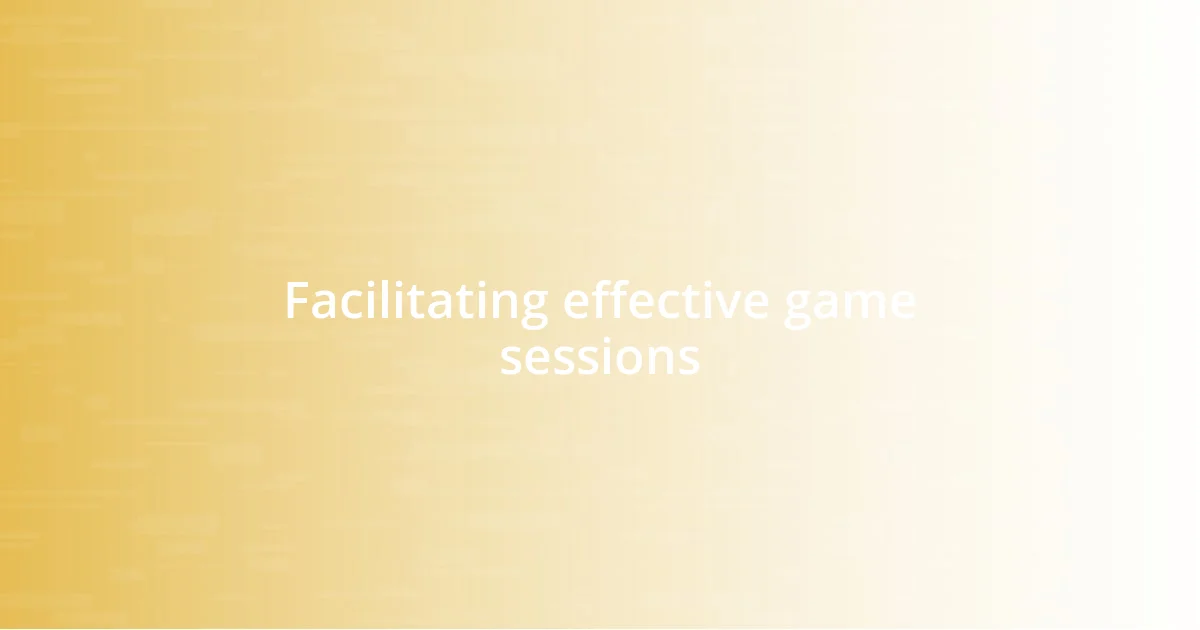
Facilitating effective game sessions
When it comes to facilitating effective game sessions, setting the right ambiance is paramount. I remember organizing a game night where we dimmed the lights and played upbeat music. It was incredible how that simple change created a vibrant atmosphere, instantly inviting everyone to relax and engage. Have you ever noticed how vital a warm environment is to getting people to open up and participate?
Another key element is clear communication. Before we dive into the games, I always make it a point to explain the rules thoroughly and encourage questions. Just the other week, during a challenging game of charades, a few teammates felt lost at the start. Once I clarified the rules and encouraged their input, the laughter and teamwork blossomed instantly. This kind of clarity not only enhances performance but also builds trust within the group.
Finally, don’t forget to be flexible as a facilitator. While I usually have a plan, I’ve learned to adjust based on the group’s energy and dynamics. Once, we started a competitive game, but the energy in the room shifted to something more collaborative, so I opted to switch to a cooperative challenge instead. It was amazing to see the team flourish when I allowed the session to flow with their vibes. Isn’t it fascinating how adaptability can lead to deeper connections and unexpected teamwork magic?
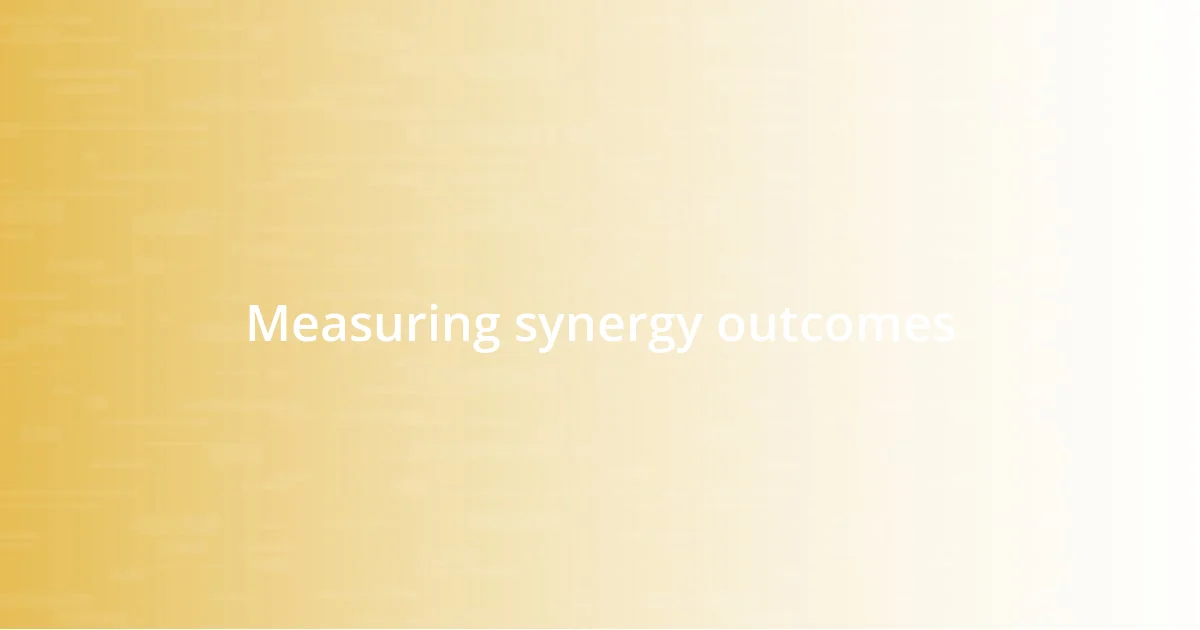
Measuring synergy outcomes
Measuring synergy outcomes can often feel elusive, but I’ve found practical methods can make a significant difference. For example, after a recent team-building exercise, we used surveys to gauge participants’ feelings about collaboration and trust. The results were illuminating—many reported feeling more connected and ready to tackle challenges together. Have you ever noticed how quickly engagement can shift when you provide a platform for honest feedback?
Another approach I’ve adopted is observing interactions during gameplay. There was this one memorable session where I made a point to take notes on how team members communicated. I was amazed at how eye contact, laughter, and even silence spoke volumes about team dynamics. Isn’t it fascinating to think how subtle cues can reveal the depth of synergy in a group?
Lastly, qualitative reflections post-game can be invaluable. Following one intense game, we shared our thoughts in a circle, and I couldn’t help but feel how those dialogues transformed the way we viewed collaboration. Hearing my colleagues articulate their insights and feelings made the synergy outcomes tangible and understandable. It really made me question: how often do we take the time to reflect on these moments in our daily work life?
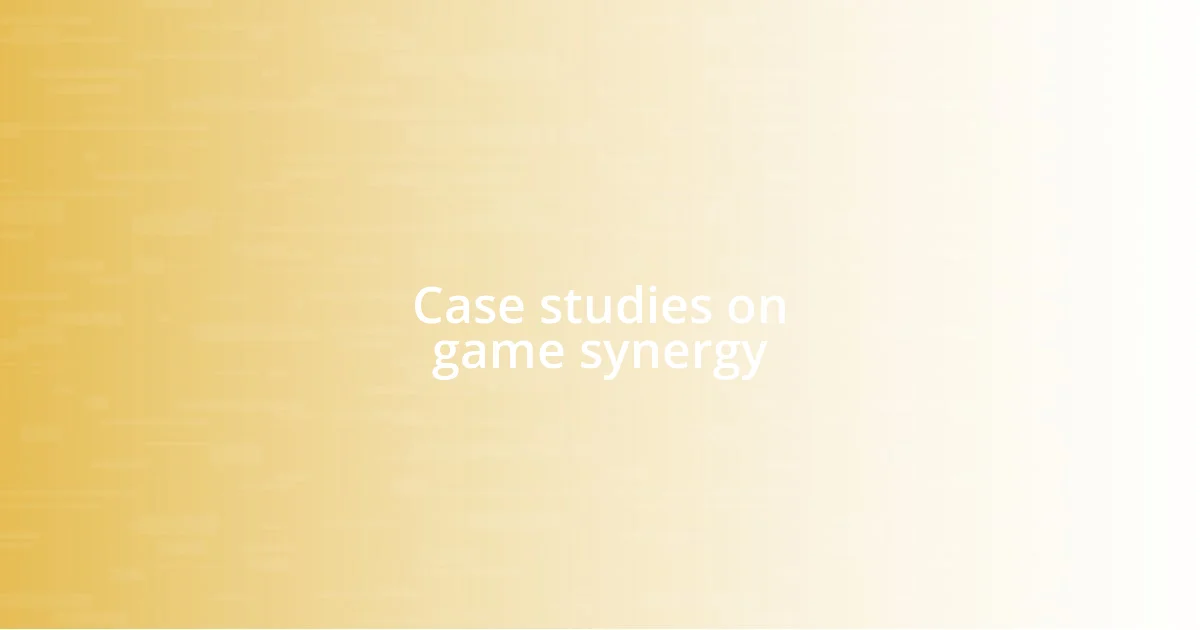
Case studies on game synergy
During a recent training session on effective collaboration, I implemented a game called “The Trust Fall.” Participants were split into pairs, and it was enlightening to witness the initial hesitance transform into genuine trust as they let themselves fall back into their partner’s arms. Through this experience, I felt a shift in energy; the laughter and excitement that followed created an unspoken bond among the participants. Isn’t it incredible how a simple game can break down barriers that are often hard to navigate in traditional settings?
Another eye-opening case came from a charity fundraiser I organized where we played a collaborative board game designed to solve community issues. Watching my colleagues strategize together, I couldn’t help but notice how their competitive instincts transformed into a shared purpose. It was as if the game had reshaped their roles from individuals to a unified team, highlighting the importance of synergy in achieving common goals. Have you ever experienced a moment where teamwork transcended competition in such an unexpected way?
Lastly, I recall a virtual escape room challenge that we participated in last winter. The infectious enthusiasm during the gameplay sparked spontaneous conversations afterward, resulting in a brainstorming session that filled our whiteboard with fresh ideas. I truly believe that those engaging moments create a fertile ground for innovation and camaraderie. Isn’t it fascinating how the synergy from games can spill over into real-world collaboration, igniting creativity and connection among teams?








